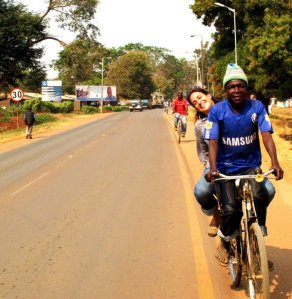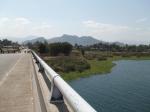Two weeks ago was the UN’s Annual World Water Day. Last year, I celebrated this event in Tanzania and had to travel almost 12 hours by bus to reach the location, but I was lucky enough to have Malawi’s celebrations based here in my current home district of Mangochi this year. The UN created World Water Day in an effort to raise awareness surrounding water issues, and there is a different water related theme each year — 2011’s theme being Urban Water Supply, while 2012’s was Water and Food Security (i.e. irrigation projects and water used for agricultural benefits).
Malawi’s World Water Day celebrations this year were hosted by the President, Bingu wa Mutharika, and thus the celebrations on the whole ended up being more of a political rally than an actual celebration/discussion of Water and Food Security. That, however, was of lesser concern to me than how WWD represented an obviously flawed prioritization of financial resources on the part of Malawi’s Ministry of Irrigation and Water Development.
At World Water Day, there we large amounts of free goods given out — most noticeably t-shirts, polo shirts, hats, and chitenjes (African printed fabrics worn as wrap) all displaying the ‘World Water Day 2012’ logo. Here is just a rough estimate (and a conservative one at that) or how much was spent on these items (USD$1 = roughly 170 Kwacha):
- T-shirts for general public and all district staff: 300 t-shirts x 400K each = 120,000 Kwacha
- Hats for general public and all district staff: 300 t-shirts x 600K each = 180,000 Kwacha
- Polo shirts for district officials who helped to plan the program, and for higher officials: 100 shirts x 1,000K each = 100,000 Kwacha
- Chitenjes for women and for all dancers/performers: 300 chitenjes x 700K each = 210,000 Kwacha
This is a low end estimate of how many of these shirts/goods that I saw on Thursday, and it adds up to a total of approximately 610,000 Kwacha (roughly USD$3,600). That’s a lot of money. And that is JUST on free goods given out to district/NGO/ministry staff and other people associated with the planning of the World Water Day. That does not even begin to include the other expenses — such as tents, red carpets, stages, microphones, cameramen, security staff, allowances for staff from other districts to come to Mangochi, etc. — that were incurred in order to welcome the president for WWD.
I understand the importance of World Water Day as an awareness raising campaign. For example, on the few days leading up to WWD, I saw multiple discussions on TV and radio networks centered around water issues in Malawi. The actual celebration (had it not been turned into a political ploy by the president), would have been a legitimate awareness raising campaign worthy of investing money in. That being said, spending 610,000 kwacha on free goods is an inexcusable waste of precious funding/resources.
The office where I work, the Mangochi District Water Development Office, deals primarily with rural water supply. It would be logical to think that a country who put so much money into a World Water Day celebration would thus value water projects and well support an office like my own. Mangochi, like most districts in Malawi, is funded directly by multiple NGOs who have individual projects running; however, most NGO funding only covers work directly related to their specific project objectives. Therefore, if our office wants to do general activities not directly tied to NGO programs — such as routine data collection or follow-up visits to communities having waterpoint maintenance issues — they rely on direct government funding to do these. Mangochi District Water Office’s average funding received from the Ministry is 106,000K per month (but is often as low as 60,000K depending on the month). This means that the amount of money spend on free t-shirts and hats is equivalent to SIX MONTHS worth of government funding given to our office.
More times than I can count, I have come in to the office just to see the whole staff sitting outside under a tree playing checkers or bawo (an African version of mankala) all day — not because of laziness, but instead because there is no funding for fuel, motorcycle maintenance, or some other necessary item to do their work. Village meetings should be attended by our staff but are not, borehole drillings should be overseen by our staff but they aren’t, and so on and so forth — all due to lack of funding. So to see six months worth of funding invested in free goods for a quasi-political rally held under the hoax of World Water Day (which is supposed to symbolize a dedication to actively improving water issues), is frustrating beyond words.
What will it take to set the Ministry of Irrigation and Water Development’s priorities back on track and encourage them to fund necessary causes over frivolous ones? To increase our office budget rather than buy hundreds of free t-shirts? If only I knew… if only.
Peace, love, and politics,
Lisa





